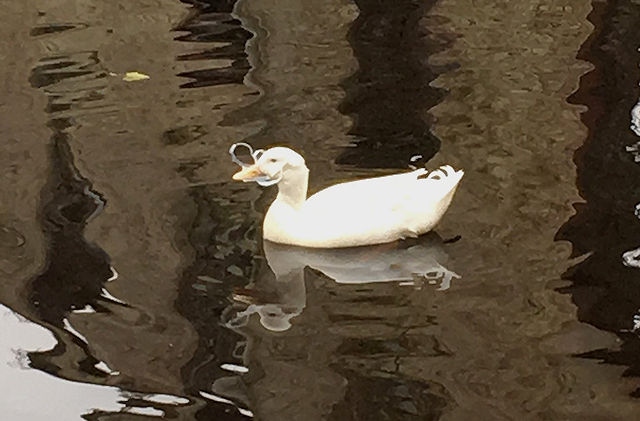New figures reveal almost 4,000 calls about litter-affected animals made to RSPCA last year
Date published: 21 April 2021

Photo: Ian Duckworth
A duck caught in plastic
As new figures reveal that the RSPCA took nearly 4,000 (3,874) calls about animals affected by litter in 2020, the animal charity is urging people to do their bit and pick up litter.
Despite people being in lockdown for many months, the RSPCA still received more than 10 calls a day about animals affected by litter including:
- a duck tangled in a medical face mask
- a baby hedgehog with plastic wrapped around her neck
- a fox with his head caught in an old Cornish pasty wrapper
- a gannet entangled in plastic
In Greater Manchester, 125 calls were received, one of the highest outside London, where most calls were made (444).
The animal welfare charity is urging people to help protect animals by picking up any litter they see lying around as well as ensuring they take their litter home with them or disposing of it properly and responsibly.
Head of the RSPCA’s wildlife department Adam Grogan said: “Our staff deal with thousands of incidents every year where animals have been impacted by litter - and they’re the ones that we know of. I’m sure for every animal we’re able to help there are many that go unseen, unreported and may even lose their lives.
“Litter is one of the biggest hazards our wildlife faces today and the pandemic has just added to the problem with many disposable masks just being discarded on the ground. These are a new danger to animals and we’ve been called out to rescue animals like ducks and gulls caught up in the masks’ elastic straps. That’s why we’re calling on the public to get involved and help remove litter that may endanger animals.”
As well as everyday rubbish, the RSPCA also sees many animals arriving into its care with terrible injuries caused by angling litter such as discarded fishing line and hooks to plastic netting.
Nearly 40 per cent (1,510) of all litter-related calls to the RSPCA last year were about animals that had specifically become caught in fishing litter, from a seal being strangled by an old fishing net to dozens of swans who swallowed or were pierced by old fishing hooks or became entangled in fishing line.
Adam added: “Animals who get their heads or necks stuck in litter can suffer severe injuries as they struggle to break free and can even suffocate, while others will slowly grow weaker and weaker as they try to hunt or find food or water.
“Others will get fishing line or netting cutting deep into their skin, affecting circulation and with wounds becoming seriously infected. These hazards can very quickly become a matter of life or death for these animals and action is urgently needed to tackle this problem head-on. It’s up to every one of us to do our bit in the war against litter.”
Adam added: “The majority of anglers do dispose of their litter properly and it is frustrating that those who don’t possibly don’t realise how dangerous it is to animals. Discarded line in particular is a terrible hazard for wildlife, particularly as it can be almost invisible.
“We strongly urge those who enjoy fishing to be extra cautious to make sure nothing is left behind. Most anglers are very responsible when disposing of their litter, but it only takes one piece of snagged line to be left in a tree or dropped near the water to endanger the life of an animal. We ask that all those who enjoy fishing to follow the Angling Trust Take 5 campaign and make use of the recycling scheme to dispose of their waste tackle.
“If members of the public see discarded litter we would encourage them to pick it up safely and put it in the bin, remembering to wash their hands afterwards. Their action could save an animal’s life.”
If you’re concerned about the welfare of an animal, please contact the RSPCA’s emergency hotline on 0300 1234 999.
Do you have a story for us?
Let us know by emailing news@rochdaleonline.co.uk
All contact will be treated in confidence.
Most Viewed News Stories
- 1Newhey's Char Steakhouse and Bank Chamber close with immediate effect
- 2Six men arrested in Rochdale child exploitation investigation
- 3Royton haulage firm fined after Rochdale dad went to work and didn’t come home
- 4Two men arrested after police chase ends up in Middleton river
- 5Obituary: Jean Ashworth
To contact the Rochdale Online news desk, email news@rochdaleonline.co.uk or visit our news submission page.
To get the latest news on your desktop or mobile, follow Rochdale Online on Twitter and Facebook.


